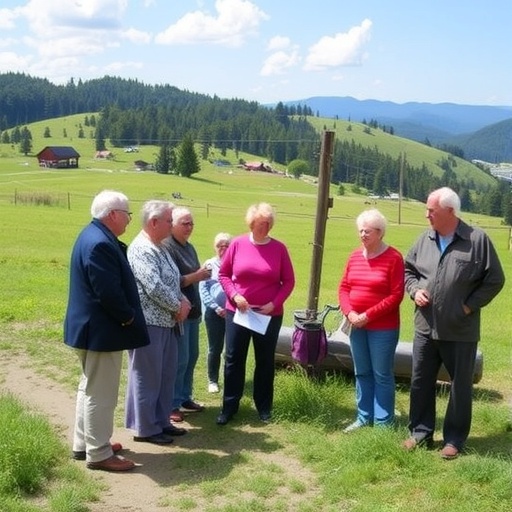In the vast and complex educational landscape of China, where urban and rural divides present persistent challenges, an innovative approach has emerged that leverages the often overlooked potential of retired urban teachers. This strategy is rooted in the nation’s demographic shift toward an aging society and the acute shortage of qualified educators in impoverished rural regions. Groundbreaking research conducted at Guang Ming Primary School in western China illuminates how the re-employment of retired teachers from urban areas can serve as a pivotal force in enhancing educational quality and professional growth in rural schools.
Amidst China’s broader sociopolitical context, the Ministry of Education’s 2018 “Program of Support to Impoverished Rural Schools by Retired Teachers with Professionalism, Experience and Wisdom” serves as the cornerstone policy driving this transformative model. Guang Ming Primary School exemplifies this initiative by integrating retired urban educators into its faculty, thereby setting a precedent for supporting rural education through both external and internal developmental processes. This dual-path framework not only supplements rural schools with experienced human capital but also fosters endogenous growth among young and middle-aged teachers.
The study underpinning these findings adopts a qualitative research design, distancing itself from traditional quantitative or purely historical methodologies. Researchers conducted in-depth interviews with a range of stakeholders—including school principals, vice principals, younger teachers, and retired urban educators—to uncover the nuanced interactions and impacts of the support system. Data analysis revealed two dominant themes: external support as a vital resource infusion, and endogenous development as the cultivation of sustainable internal capacities within rural schools.
Within the context of external support, retired urban teachers contribute directly to classroom teaching, guide curriculum construction, and assist in school governance. Their involvement transcends mere augmentation of teacher numbers—it signifies an infusion of pedagogical expertise and institutional knowledge. By actively shaping classroom environments and administrative processes, these retired educators catalyze improvements in teaching quality and operational efficacy at Guang Ming Primary School.
Endogenous development unfolds primarily through the empowerment of younger and middle-aged rural teachers. Urban retired teachers act as mentors and trainers, offering targeted professional development sessions that cover curriculum optimization, educational policies, and contemporary teaching practices. This internal capacity-building ensures that improvements have lasting effects, embedding new competences within the existing educational workforce and supporting continuous school evolution beyond the tenure of the retirees themselves.
The intricate relationship between external support and endogenous development presents a comprehensive model wherein each path complements the other. External contributions provide immediate and tangible improvements, while internal developmental mechanisms drive long-term sustainability and professional autonomy. This holistic framework addresses critical gaps in the existing literature, which has historically focused more narrowly on higher education or the re-engagement of retired teachers with their former schools, often neglecting systematic support for rural educators and professional empowerment.
Contextualizing these findings within China’s cultural and demographic realities highlights the broader societal relevance of the model. As the nation grapples with a rapidly aging population and a stark urban-rural educational divide, mobilizing retired teachers emerges as a strategic response that addresses both issues simultaneously. By tapping into the vast reservoir of experienced human resources, China advances its national agenda of active aging, turning potential demographic challenges into opportunities for educational innovation.
Furthermore, the outcomes of this research extend beyond theoretical contributions to include tangible policy recommendations. The study advocates for the creation of a supportive policy environment that recognizes and incentivizes the role of retired urban teachers. This includes addressing issues such as remuneration, employment identity, and institutional support systems, thereby ensuring that these educators remain motivated and effectively integrated into rural school communities.
The practical implications for impoverished rural schools are equally profound. The research suggests that rural schools should adopt transparent recruitment strategies to attract qualified retired urban teachers. Additionally, fostering a democratic and open teaching environment is emphasized as critical for maximizing the positive impacts of these retirees. Such an environment encourages collaboration, innovation, and mutual respect among teachers of diverse backgrounds and experience levels.
Notwithstanding its promising contributions, the study acknowledges inherent limitations. The specific theoretical framework developed, deeply rooted in China’s unique socio-cultural and educational context, may not seamlessly translate to other countries with differing social structures and educational policies. Cross-cultural variations in aging, education, and teacher re-employment necessitate cautious interpretation and application of these findings globally.
Moreover, the study calls for further research to address existing gaps. Particularly, there is a need for critical examination of failed or less effective practices of retired teacher engagement, providing a balanced perspective that goes beyond success stories. Additionally, investigating the perceptions of rural students toward the involvement of retired urban teachers could offer insights into the impact of these interventions on learner experiences and outcomes.
In conclusion, the innovative model birthed at Guang Ming Primary School offers a compelling blueprint for integrating retired urban teachers into rural educational development. By balancing external input with internal generation, this approach optimizes human resources and fosters sustainable professional growth, thereby advancing China’s goals of educational equity and active societal aging. As the world confronts similar demographic and educational challenges, this Chinese experience contributes valuable knowledge and inspiration for broader application and future policy formulation.
Subject of Research: The role of urban retired teachers in supporting and empowering impoverished rural schools in China.
Article Title: External input and internal generation: the Chinese experience of how urban retired teachers maximize support for impoverished rural schools.
Article References:
Cheng, H. External input and internal generation: the Chinese experience of how urban retired teachers maximize support for impoverished rural schools. Humanit Soc Sci Commun 12, 968 (2025). https://doi.org/10.1057/s41599-025-05421-7
Image Credits: AI Generated




